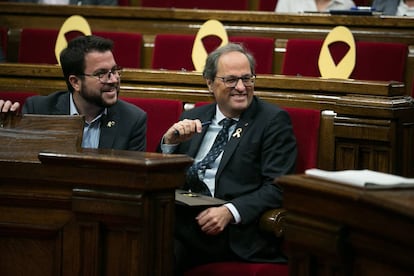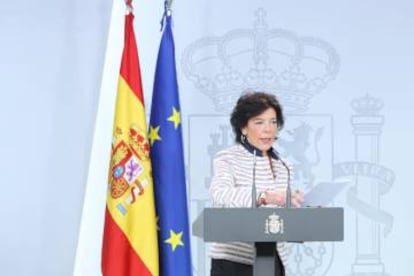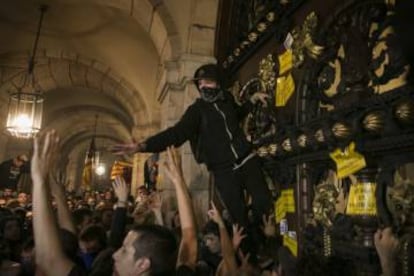Spanish government to Catalan leader: “We don’t accept ultimatums”
Following violent incidents in Barcelona, Quim Torra gives Madrid a month to come up with an offer for an agreed referendum on independence

The Spanish government on Tuesday said it “will not accept ultimatums,” shortly after Catalan premier Quim Torra warned he was giving Prime Minister Pedro Sánchez a month to come up with an offer for an authorized independence referendum in the region, or risk losing separatists’ support inside Spain’s lower house of parliament, Congress.
The exchange came a day after violent incidents in Catalonia on the first anniversary of an unauthorized referendum on a split with Spain.
The patience of Catalans is not infinite
Catalan premier Quim Torra
“This government does not accept ultimatums,” said Spanish government spokeswoman Isabel Celaá at a news conference on Tuesday. “The head of the Catalan government does not have to wait until November to know what our reply is: the answer is yes to self-government, no to independence. The Catalan government must respect social coexistence and the rights of both nationalists and non-nationalists. We must remind the Catalan government, once again, that a divided society is a society without a future.”
Speaking inside Catalan parliament earlier on Tuesday, Torra had said that separatist parties might withdraw their support for Sánchez inside Congress, implying this could lead to early elections in Spain as the Socialist Party (PSOE) heads a minority government with just 84 lawmakers in the 350-seat house. Sánchez became prime minister in early June through a no-confidence vote against Mariano Rajoy in which small regional parties were instrumental. The Socialist leader said then that he plans to serve out the remainder of the term until 2020.

Speaking at the United Nations General Assembly in New York last week, Sánchez said that if Catalan secessionists choose the path of conflict, the political term will be over. And on Tuesday the prime minister tweeted that “violence is not the way.”
Torra himself has been strongly criticized over the acts of violence during the celebration of the first anniversary of the referendum. At an institutional event on Monday morning, Torra had encouraged the Committees to Defend the Republic (CDR), self-organized groups behind roadblocks and other public acts of protest, to “keep up the pressure.” Later that night, hundreds of radical protesters attempted to storm the regional parliament, leading to clashes with riot police.
Radical secessionists are now asking for Torra’s resignation for using the Catalan police force against them, in what they see as an act of betrayal, while unionist parties say he should step down for encouraging street violence. Against this backdrop, the Catalan leader on Tuesday told Madrid that he wants to see progress on an agreed referendum, or else the pro-independence parties “will not be able to guarantee any kind of stability inside Congress. The patience of Catalans is not infinite.”

Sources at La Moncloa, the seat of Spanish government, said that Torra’s verbal escalation is a response to the criticism he has received. Torra, they said, is once again pointing his finger at the outside enemy in order to prevent further internal division within the secessionist movement, which is torn between moderates who want to reduce the tension – headed by the Catalan Republican Left (ERC) – and those who wish to ramp up the pressure, such as the anti-establishment Popular Unity Candidacy (CUP).
“We know that on the one hand there is the emotional rhetoric, and on the other the facts. The bilateral committees are showing results,” said Celaá on Tuesday, insisting on the importance of keeping open the communication channels between Madrid and Barcelona, which Sánchez has made a priority of his administration. During Mariano Rajoy’s tenure, the Catalan government held an unauthorized referendum on October 1, 2017 and later that month made a unilateral independence declaration inside the regional parliament. Madrid used a constitutional tool to temporarily suspend Catalan self-government and called early elections in the region, with separatist parties winning a collective majority of seats with around 48% of the votes.
English version by Susana Urra.
Tu suscripción se está usando en otro dispositivo
¿Quieres añadir otro usuario a tu suscripción?
Si continúas leyendo en este dispositivo, no se podrá leer en el otro.
FlechaTu suscripción se está usando en otro dispositivo y solo puedes acceder a EL PAÍS desde un dispositivo a la vez.
Si quieres compartir tu cuenta, cambia tu suscripción a la modalidad Premium, así podrás añadir otro usuario. Cada uno accederá con su propia cuenta de email, lo que os permitirá personalizar vuestra experiencia en EL PAÍS.
¿Tienes una suscripción de empresa? Accede aquí para contratar más cuentas.
En el caso de no saber quién está usando tu cuenta, te recomendamos cambiar tu contraseña aquí.
Si decides continuar compartiendo tu cuenta, este mensaje se mostrará en tu dispositivo y en el de la otra persona que está usando tu cuenta de forma indefinida, afectando a tu experiencia de lectura. Puedes consultar aquí los términos y condiciones de la suscripción digital.








































